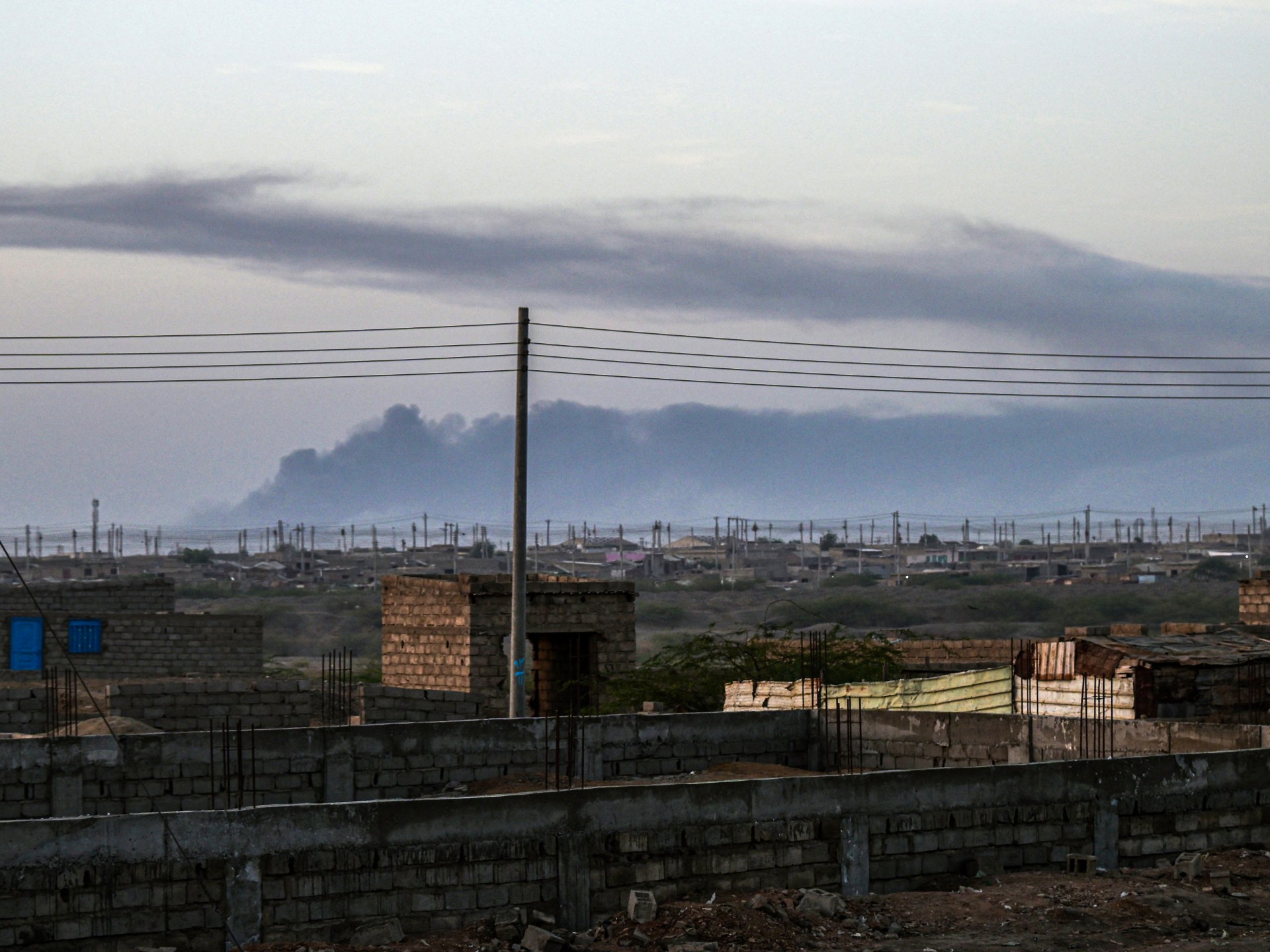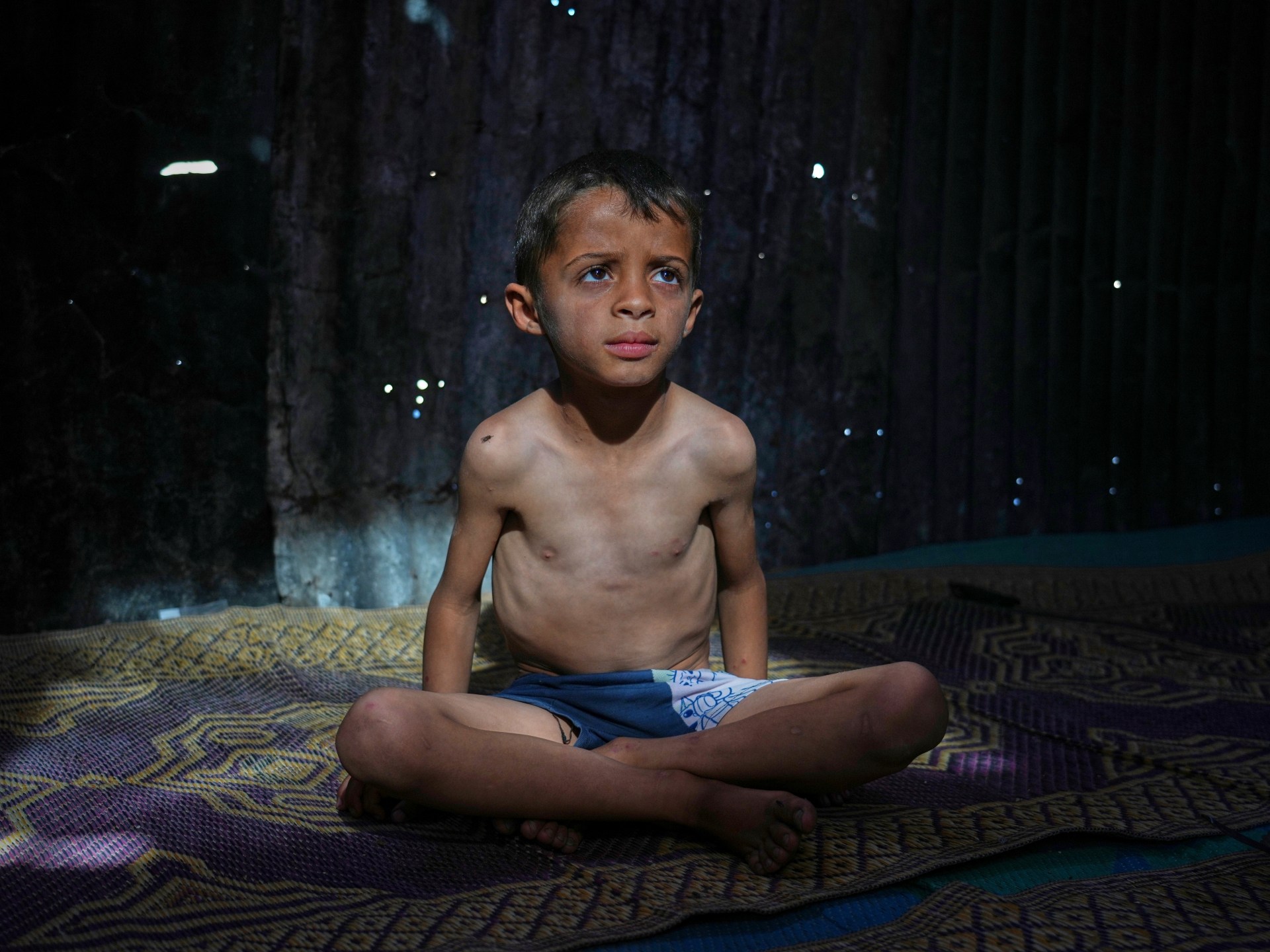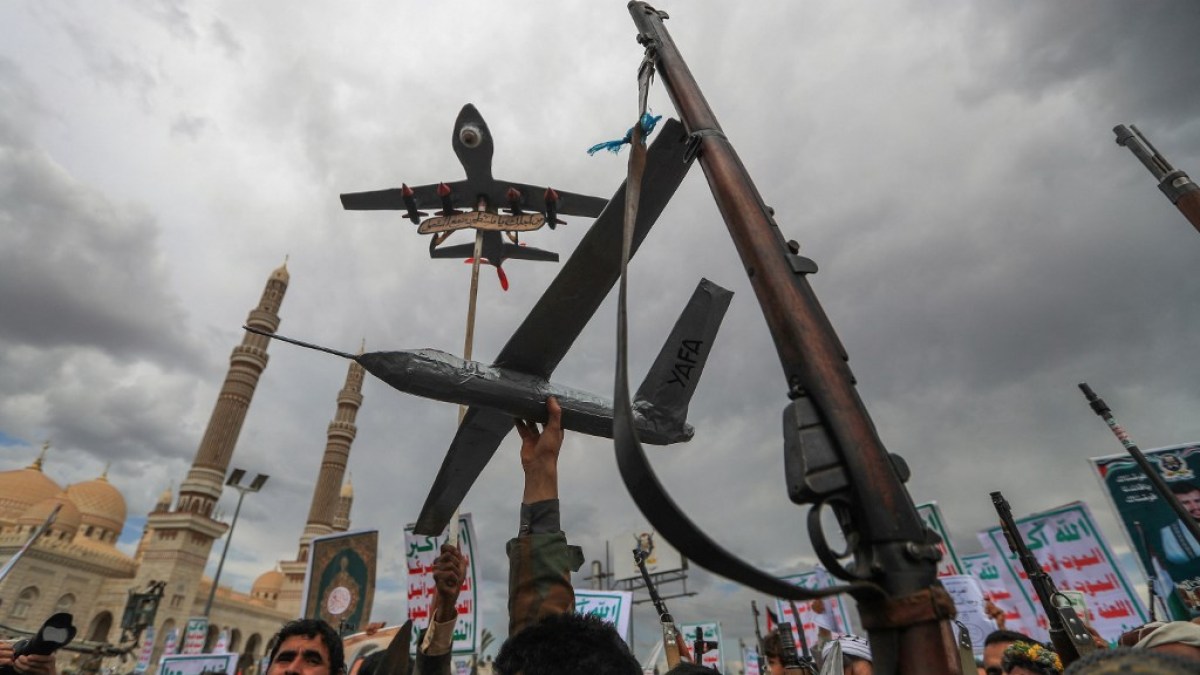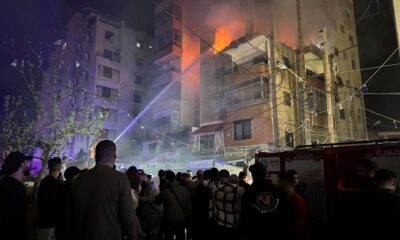Middle East
Sudan’s RSF carries out drone attack near Port Sudan airport: Army | News

DEVELOPING STORYDEVELOPING STORY,
The army says an airbase, cargo warehouse and some civilian facilities were targeted in Port Sudan in the first RSF attack in the eastern city.
Sudan’s army says the paramilitary Rapid Support Forces (RSF) attacked a military airbase and other facilities in the vicinity of Port Sudan airport.
The army said on Sunday that the airbase was targeted using a drone, as well as a cargo warehouse and some civilian facilities, in the first attack in the eastern city by the RSF.
There are reports of some damage after drones hit an ammunition depot.
“Both the civilian and military airports are in the same place. What we know from residents in the port city is that five drones were launched by the RSF and targeted the airbase,” Al Jazeera’s Hiba Morgan said, reporting from the capital, Khartoum.
“There is a section of the airport that is for civilian flights, but there are military flights that land in the same airport. So, it’s not clear if the drones were targeting the military or civilian facilities or both,” she said.
“There are no reports of civilian casualties yet, and it’s not clear if the RSF was trying to target the fighter jet that was displayed in an air force show there on Saturday afternoon.”
A Sudanese passenger plane was redirected to Jeddah Airport after being unable to land at Port Sudan Airport, according to navigation data from Flight Radar.
The data showed that the plane took off from Dubai International Airport but had to change its route and make an emergency landing at King Abdulaziz International Airport. The plane performed a circular maneuver over the Red Sea before heading back towards Jeddah.
Sudan’s army and the RSF have been engaged in intense fighting since April 2023, with the war damaging the country’s infrastructure and displacing millions.
Middle East
Nearly 290,000 Gaza children on ‘the brink of death’ amid Israeli blockade | Israel-Palestine conflict News

More than 3,500 children below the age of five years “face imminent death by starvation”, Gaza’s Government Media Office (GMO) has said, adding that some 70,000 children are being hospitalised in the enclave due to severe malnutrition amid more than two months of total Israeli blockade.
“Under this systematic blockade, more than 3,500 children under the age of five face imminent death by starvation, while approximately 290,000 children are on the brink of death,” the GMO statement on Telegram said on Sunday.
“At a time when 1.1 million children daily lack the minimum nutritional requirements for survival, this crime is being perpetrated by the ‘Israeli’ occupation using starvation as a weapon, amid shameful international silence,” it added.
At least 57 Palestinians have starved to death, causing global outrage, but that has failed to convince Israel to allow entry of aid into the enclave of 2.3 million people.
A shortage of food and supplies has driven the territory towards starvation, according to aid agencies. Supplies to treat and prevent malnutrition are depleted and quickly running out as documented cases of malnutrition rise.
The price of what little food is still available in the market is unaffordable for most in Gaza, where the United Nations says more than 80 percent of the population relies on aid.
Aid groups and rights campaigners have accused Israel of using starvation as a weapon of war.
Israel, for its part, insists the blockade is necessary to pressure Hamas to release the captives it still holds. Of the 59 captives still in Gaza, 24 are believed to be alive.
Israel’s war on Gaza has killed at least 52,495 Palestinians and wounded 118,366, according to Gaza’s Ministry of Health. The GMO updated the death toll to more than 61,700, saying thousands of people missing under the rubble are presumed dead.
Middle East
Are Yemen’s non-Houthi groups seeking US support to attack the Houthis? | Houthis

Anti-Houthi factions in Yemen could be vying for US support to attack the movement’s territory, analysts and experts told Al Jazeera, following intensified air strikes on Houthi targets by the United States.
The war in Yemen has largely been frozen for the last three years. Still, groups aligned with the Yemeni government have started signalling that they could launch operations against areas controlled by the pro-Iranian Houthis, including the crucial port of Hodeidah.
A similar campaign on Hodeidah, a critical entry point for food and goods on the Red Sea coast, seemed imminent in 2018, only to be aborted after intervention from the United Nations and the international community, who feared a humanitarian disaster in Yemen.
But experts and analysts expressed doubt that an attack by anti-Houthi groups on their domestic rival would be successful, despite some likening it to the offensive that unseated another Iran ally, former Syrian President Bashar al-Assad, in late 2024.

“Pro-ROYG [Republic of Yemen Government] voices have been asserting that ground operations against the Houthis – in Hodeidah and potentially elsewhere – are imminent,” Hannah Porter, an independent Yemen analyst, told Al Jazeera.
“My impression so far is that these comments are just meant to garner external support from the US or Saudi [Arabia] for a takeover of Hodeidah.”
Vying for US support
The Houthis, or Ansar Allah as they are officially known, marched into and took over the Yemeni capital Sanaa in 2014. Soon after, a Saudi Arabian-led coalition intervened on behalf of Yemen’s internationally recognised government to fight the Houthis.
Anti-Houthi forces achieved some success in the early years of the war, but the failed Hodeidah campaign seemed to slow their momentum, and the Houthis have largely been on top militarily since then.
Saudi Arabia announced in March 2022 that it would stop hostilities in Yemen, and a UN-brokered truce stopped much of the fighting the following month.
By then, the Houthis still controlled Sanaa and much of northwest Yemen, while various anti-Houthi groups held the key port city of Aden and much of southern and eastern Yemen.
The Yemeni government has undergone major changes in the past few years, with President Abd-Rabbu Mansour Hadi suddenly stepping down in 2022 and handing over power to an eight-member Presidential Leadership Council (PLC), which has, so far, proven ineffective.
PLC Prime Minister Ahmed Awad Bin Mubarak resigned on Sunday, claiming to have been blocked from fulfilling his duties, as reports circulated of conflicts between him and President Rashad al-Alimi and accusations of mission creep.
The PLC includes members who have previously fought against the Yemeni government. They include Aydarous al-Zubaidi, the head of the separatist Southern Transitional Council (STC), and Tareq Saleh, nephew of former President Ali Abdullah Saleh, a one-time ally of the Houthis.
But Houthi attacks on what they claim are Israeli-linked ships in the Red Sea, as well as attacks on Israel itself, have led to a bombing campaign against Yemen, and some anti-Houthi forces now see an opening.
“We’ve been seeing various anti-Houthi factions lobbying for US support since the start of the Gaza crisis,” Nick Brumfield, a Yemen expert, told Al Jazeera.
“Both the Yemeni government and the Southern Transitional Council have competitively sought to present themselves as the solution to the US’s need for a partner on the ground against the Houthis in Yemen.”

Plan versus reality
The Yemeni government has long emphasised that its ultimate goal is the defeat of the Houthis and an end to the group’s “coup” against the Yemeni state.
In early April, President al-Alimi spoke of the importance of national unity “to topple the coup”, adding that the “decisive hour” of the “battle for liberation” was drawing near.
Al-Alimi has not given any indication of when that battle against the Houthis would be, but forces under the umbrella of the Yemeni government may see the intensification of US air strikes under President Donald Trump’s administration.
The US claims the strikes targeted Houthi leaders and have significantly degraded Houthi capabilities. Houthi authorities say that at least 123 Yemenis have been killed in the strikes since they intensified in mid-March, many of them civilians.
Reporting from The Wall Street Journal (WSJ) and Bloomberg has claimed that discussions for an anti-Houthi ground operation, backed by the US, are under way.
The WSJ specifically mentioned that the United Arab Emirates had raised the plan with the US, but the UAE has denied any involvement, with Assistant Minister for Political Affairs Lana Nusseibeh calling them “wild unsubstantiated stories” on April 17.
The UAE officially withdrew its military forces from Yemen in 2019.

Tareq Saleh has been mentioned in news reports as a likely figure leading any anti-Houthi campaign on the Red Sea coast.
But, experts say, there has thus far been no noticeable mobilisation on the ground by anti-Houthi Yemeni armed groups.
“The PLC has been speaking about liberating Sanaa and such,” Raiman Al-Hamdani, a Yemen researcher with ARK, an international development company, told Al Jazeera.
“As far as I know, there has been little mobilisation towards this end. Whether they can is a very different story, especially with Saudi Arabia and the UAE no longer wanting to engage in war with the Houthis.”
After years of fighting, the Saudis and Houthis entered into ceasefire discussions in 2022, leaving anti-Houthi groups – including the Yemeni government – uncertain over their future and the Houthis further entrenched in power.
Al Jazeera reached out to the Yemeni government for comment on this story but received no response before publication.
Comfortable in the status quo
An advance on Sanaa, high up in the Yemeni mountains and closer to the Houthi heartland in Yemen’s far north, would be difficult for Yemeni government forces, and would involve a massive turnaround in fortunes, as well as turning Yemen’s most powerful tribes, many of whom currently back the Houthis.
The main target of any US-backed operation, however, would likely be Hodeidah, which lies on a coastal plain and whose population is less supportive of the Houthis. Losing Hodeidah, as well as other areas of the Red Sea coast, would still represent a significant loss for the Houthis and limit their ability to attack shipping on the vital sea route.
That would line up with the primary goal of the US to curtail the ability of the Houthis to attack regionally, even if the group were still able to launch missiles further afield.

But any effort to take Hodeidah would still likely require a fierce campaign, and thus far, no force – including the US – appears to be willing to fully back anti-Houthi forces militarily.
That is problematic for the anti-Houthi forces and potentially a non-starter, considering the Yemeni government’s inability to defeat the Houthis even when it had heavy military support from the Saudi-led coalition earlier in the war.
“The Houthis will throw all their weight behind defending Hodeidah,” Porter said. “Their port access is critical to their survival.”
She added that the Houthis were likely in a better military position to defend Hodeidah than any group attempting to advance on it.
“Honestly, I think the Republic of Yemen Government and the Presidential Leadership Council are not very invested in shifting the status quo,” Porter said.
“If there was a viable opportunity to take Hodeidah Port, then they would seize on that, but I don’t think they’ll have the support they need.”
Middle East
Canelo Alvarez beats Scull to reclaim undisputed super-middleweight title | Boxing News

Alvarez sets up a bout with ex-welterweight champ Terrence Crawford after beating Scull by unanimous decision.
Saul “Canelo” Alvarez has re-unified the IBF super middleweight championship with his WBA (Super), WBC and WBO belts with a unanimous decision victory over William Scull, setting up a bout with former welterweight champion Terence Crawford in September.
Cuba’s Scull, who had an advantage in height and reach over Alvarez, was unable to find an answer to the Mexican’s methodical stalking and effective body blows as he suffered the first loss of his professional boxing career on Sunday.
“For me, it’s a boring fight. [Scull was] not trying to win, just trying to survive. I hate these kinds of fights,” Alvarez said in his post-fight interview after all three judges awarded him the victory (115-113, 116-112, 119-109).
Alvarez, who was stripped of the IBF strap last year after choosing to fight Edgar Berlanga over the sanctioning body’s number-one contender Scull, has now become the undisputed 168-pound champion for the second time.
Scull’s quick movements were not enough to evade Alvarez’s steady onslaught early on as the Mexican landed strong body blows in the second and fourth rounds, leaving Scull momentarily off balance.
Alvarez, fighting outside the United States and Mexico for the first time, continued stalking the Cuban in the fifth round, but Scull fought back, breaking Alvarez’s guard with a right uppercut and pushing him back before catching him with a counter.
“Don’t let this guy get bigger and more confident,” Alvarez’s corner warned him at the end of the sixth round after Scull caught him with another right hand before Alvarez responded with body shots.
Alvarez landed combinations to the body in the seventh round, and caught Scull with a lead left hook near the ropes in the eighth.
Measured attacks to the body continued from Alvarez, as he landed 40 body blows in the bout while Scull managed only six, claiming the 63rd win of his professional career.
Alvarez, 34, improved to 63-2-2 with 39 knockouts after doing enough on his Saudi debut which continued his tradition of fighting during the Mexican festival weekend of Cinco de Mayo.
The Mexican said he was looking forward to returning to the ring against undefeated Crawford in Las Vegas.
“Crawford is one of the best out there, I like to share the ring with that kind of a fighter. It’s my pleasure,” he said.
American Crawford, who became the undisputed welterweight champion with a knockout win over Errol Spence Jr in 2023, said he was ready to take on Alvarez as they faced off in the ring.
“In September, I’ll show the world what greatness looks like,” Crawford said.
Alvarez signed a four-fight deal with Saudi Arabia’s Riyadh Seasons promotion in February.
In recent years, the kingdom has been pouring money into boxing events as part of Saudi Arabia’s oil-funded thrust into the sporting world, which has drawn accusations of “sportswashing” its dire human rights record.
Along with Formula One, the LIV Golf tour and attracting several ageing football stars to its domestic league, Saudi Arabia was named last year as the host of the 2034 football World Cup.
-

 Education2 days ago
Education2 days agoTrump says he will revoke Harvard’s tax-exempt status
-

 Conflict Zones2 days ago
Conflict Zones2 days agoYemen’s Houthis launch missiles at Israel, army says it intercepts | Houthis News
-

 Europe2 days ago
Europe2 days agoPrince Harry says father, King Charles, no longer speaks to him but hopes to reconcile
-

 Africa2 days ago
Africa2 days agoFear and uncertainty grip Haitian workers in Texas meatpacking plants amid immigration crackdown
-

 Europe2 days ago
Europe2 days agoAnalysis: US tariffs could make Europe ‘Great Again’ by lowering prices
-

 Sports2 days ago
Sports2 days agoGregg Popovich steps down as San Antonio Spurs head coach and is moving to team’s front office as president
-

 Middle East2 days ago
Middle East2 days agoLebanon warns Hamas against attacks threatening nation’s security | Israel attacks Lebanon News
-

 Sports2 days ago
Sports2 days agoThe larger-than-life Bob Baffert is returning to the Kentucky Derby. The identity crisis he represents in racing never left.




